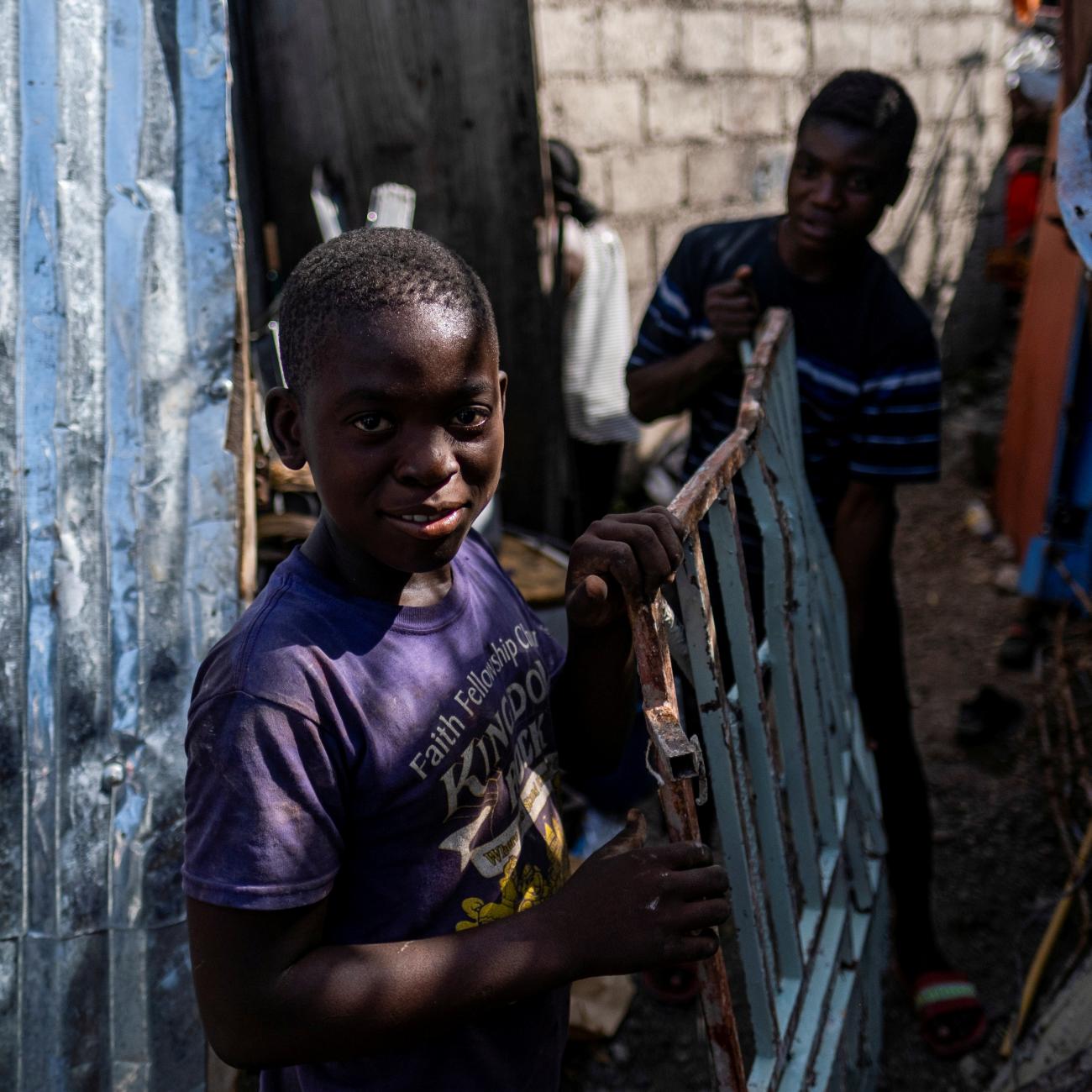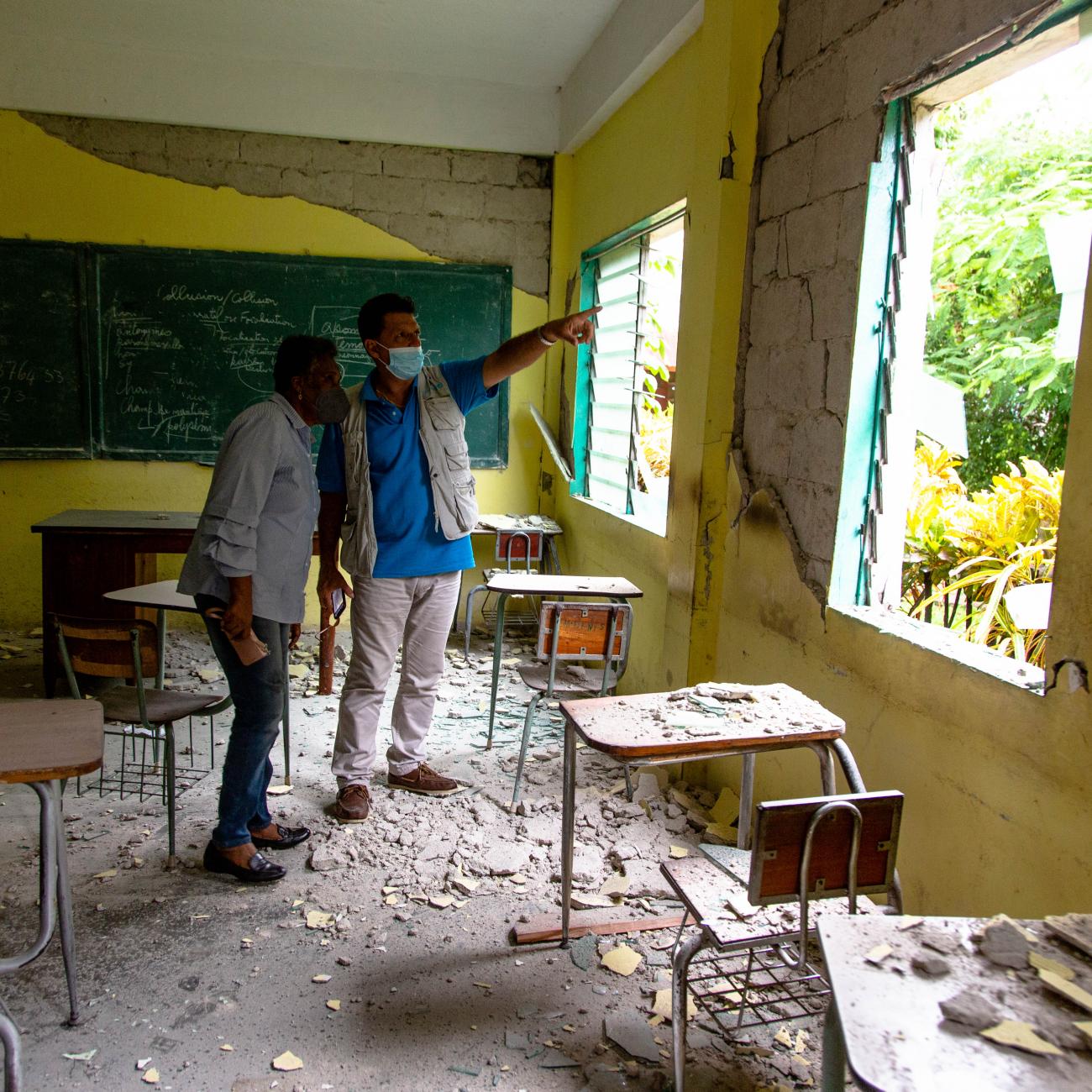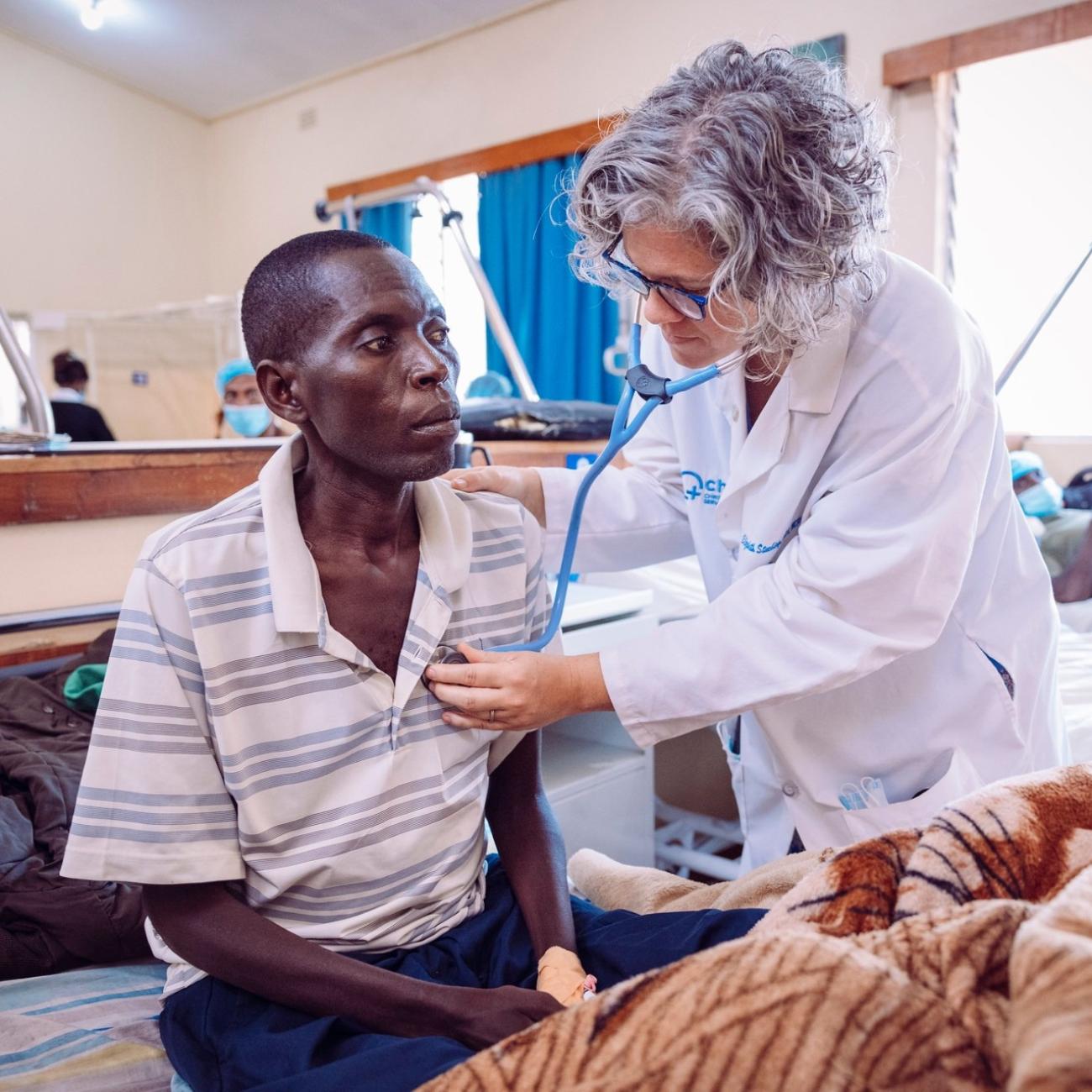When people ask me why I choose to stay in Haiti, I tell them it is my country, my home—and I continue to work here with the hope of contributing to change and peace. I will not give up on Haiti.
After I earned my medical degree in Haiti in 1979, I had the opportunity to study in the United States, where I held fellowships that included Anthony Fauci's lab at the National Institute of Allergy and Infectious Diseases. I returned to Haiti in 1983 and joined a one-year-old health-care organization called GHESKIO (a French acronym for the Haitian Group for the Study of Kaposi Sarcoma and Opportunistic Infections). GHESKIO was formed by seven pioneering doctors—I am a cofounder—working to understand a deadly new virus in Haiti that would later be identified as HIV. It became the world's first organization dedicated solely to the fight against AIDS.
Today, the eruption of violence in Haiti undercuts health care, risks famine for 11 million people, and has brought security risks to the region. But Haiti is not hopeless. Ignoring successes, I fear, will deter efforts to help my country. This is how GHESKIO achieves its unique mission amid the well-reported risks.
GHESKIO's Origins
GHESKIO's early research broke ground. It published its findings in the New England Journal of Medicine and was credited with the first comprehensive description of AIDS in low- and middle-income countries. In the early 1980s, no one knew how AIDS was transmitted, and people were very afraid. We treated patients when no one else would. We helped defeat the stigma around Haitians being a cause of AIDS.
In those early days, Bill Pape, our executive director and one of our founders, worked with his mentor, Warren Johnson, to form a partnership with Weill Cornell Medical Center for Global Health in New York City, a collaboration that continues today. Our research, lab work, and public health models influenced and improved the treatment of HIV and related sexually transmitted infections, tuberculosis, and diarrhea across Haiti and beyond.
The eruption of violence in Haiti undercuts health care, risks famine for 11 million people, and has brought security risks to the region
GHESKIO was at the forefront of reducing HIV prevalence in Haiti from 5% to less than 1.7% over the course of a decade. Our work influenced Haiti's Ministry of Health and the World Health Organization (WHO) guidelines for when to start HIV/AIDS treatment in low- and middle-income countries. We initiated a program to prevent mother-to-child transmission of HIV, and to prevent tuberculosis in people living with HIV. We've also continued to advance research on diseases such as pediatric and adult TB and cardiovascular disease, now the leading cause of death in Haiti.
On January 12, 2010, a devastating earthquake hit Port-au-Prince, killing more than 250,000 people, displacing 1.5 million, and causing billions of dollars in damage. Four of our staff members were killed, including our head of microbiology, and many of our buildings had to be rebuilt. Some 60% of our staff lost one or more family members, and 70% of their homes were damaged or destroyed.
The very next day, our remaining staff came to work to provide shelter in a tent city for more than 7,000 displaced people; to supply them with security, food, and the clean water essential for controlling the spread of disease; and to treat those who were injured.
When cholera was first diagnosed in the aftermath of the earthquake, GHESKIO played a major role in the national response. In collaboration with the Ministry of Health and the U.S. Centers for Disease Control and Prevention, and with UNICEF support, we developed a prevention, care, and training model to control Haiti's cholera epidemic. This included introducing oral cholera vaccines. Despite the catastrophic circumstances, the model worked. Using a combination of increased access to water, sanitation, and hygiene, and the vaccine, GHESKIO reduced the cholera rate in its immediate catchment area to almost zero. GHESKIO's chlorine factory, built after the earthquake, provided chlorine and trained people to make potable water for cooking and other uses. Our permanent Cholera Treatment Center has served hundreds of thousands of patients and saved countless lives.

GHESKIO also had to rebuild and repair its own facilities. It was almost like starting over, but we had no choice. We had to adapt to the situation and innovate to help our communities.
This led GHESKIO, with the collaboration of PRODEV (Progress & Development through the Youth of Haiti), to open—on an urgent timeline—a primary school in March 2010 to accommodate children of underprivileged families who had taken refuge on its downtown Port-au-Prince campus and those whose schools were destroyed by the earthquake.
In 2012, with the help of the Principality of Monaco, the École Prince Albert II de Monaco was built on the GHESKIO campus, allowing more than 350 destitute students to enroll. In 2013, the school received accreditation from the Ministry of National Education and Vocational Training of the Republic of Haiti.
Today, the school has 380 students, and each child receives a hot meal daily, a robust education, medical checkups, and health care. More than 2,000 secondary students have received scholarships to continue their studies after graduating. We've also had success implementing a community approach to HPV vaccination, with 98% of girls returning for the second dose of the two-dose vaccine series.
Women are critical to families in Haiti. GHESKIO builds their confidence, helps them develop their skills for autonomy, and creates options for how they want to live their lives. We've helped more than 5,000 women secure microcredit loans to start small businesses, pay school fees, and keep their children in school. We created vocational training so that women can start and build their own businesses. We've introduced programs that care for victims of sexual assault. These global health programs allow us to focus on not just the health of the patient but also the health of their entire family.
These global health programs allow us to focus on not just the health of the patient but also the health of their entire family
When COVID-19 broke out in 2020, GHESKIO had the only reference laboratory in Haiti outside the Ministry of Health and was able to perform PCR tests before anyone in the country. Last year, despite the growing chaos, GHESKIO saw more than 100,000 patients at no cost.
These kinds of successes aren't covered in the news. GHESKIO has worked in the impoverished and densely populated areas of Port-au-Prince for decades. Our community health workers are critical to getting people into treatment—often their first encounter with the medical system in Haiti.
Our strong bonds with the community have been essential for providing services. They have also been our human shield against the gangs for many years. When several GHESKIO staff were kidnapped this year, the kidnappers freed them without ransom after learning that they worked for the organization.

A Future in Haiti
Today is different. These times are different. My country is being torn apart by ruthless gangs. According to the United Nations, the capital is mostly controlled by gangs who want to take control of the country.
I see the havoc they wreak every day as I travel to work in our downtown facility. They are operating at a new level of violence. Killings on the streets are random. Children and women are raped. Kidnappings occur daily. Entire neighborhoods have been burnt down. Businesses and government buildings are vandalized and looted. People are starving because the gangs have taken over the ports and the airport.
The chaos has taken over, and Haiti's already fragile health-care system is struggling more than ever. More than 38% of our staff have fled the country. This is the biggest brain drain the country has ever seen. It will take at least a decade to retrain and replace health-care workers in Haiti.
People ask me if I'm afraid. There is no time to be afraid. GHESKIO is in the eye of a hurricane, and we need to push through to the other side. We will remain here and offer health care at the only health-care clinic in the middle of Port-au-Prince's dangerous and vulnerable downtown.
We cannot give up, and we cannot let the world give up on Haiti. GHESKIO needs qualified partners and collaborators for long-term technical and humanitarian assistance. Success in Haiti relies on partnerships with Haitians who are committed to the country's welfare, the welfare of our entire community. Our partnerships with Weill Cornell, the Ministry of Health, and specifically, the support we receive from the U.S. President's Emergency Plan for AIDS Relief (PEPFAR), with whom we run a network of 17 satellite clinics, all come to mind. We need partnerships that include Haitians working toward solutions on the ground, not just society elites or entrenched bureaucracies.
Every conversation I have with my Haitian colleagues, neighbors, and networks tells me Haitians long for security. They want to see their sons and daughters safe in school. To go to work. To have enough food. To drink clean water. To be free from danger and disease. This is why we are committed. This is why I stay.






